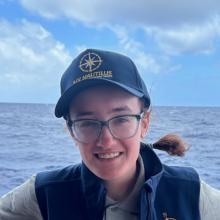
Lauren Haygood
Tell us about your work/ research. What kinds of things do you do?
I use marine sediments to investigate deep-water ventilation changes during the Quaternary. Deep-water oxygenation is an indicator for ventilation and can be reconstructed using redox-sensitive trace metals, such as vanadium (V), among others. Redox proxies are transported through the water column to the seafloor via both biotic and abiotic processes, and incorporated into the marine sediments. In the lab, I dry and homogenize samples, and then digest each sample using a three-step multi-acid digestion technique. I find the digestion process very cool, as the process involves turning a crushed sediment sample into a liquid acidified sample! I analyze samples via an Inductively Coupled Plasma Mass Spectrometry (ICP-MS), which tells me how much, for example V, I have in each sample.
What sparked your initial interest in your career?
My interest in pursuing geology initially started when I got into gardening towards the end of my junior year in high school, as I was fascinated by how plants responded based on soil composition. At university, I discovered geology was very interdisciplinary, combining subjects such as chemistry, biology, art, physics, computer science, and more. I found myself enjoying geochemistry the most, and bounced around between varying temperatures of geochemistry, to aqueous environments. I’m now pursuing paleoceanography, and in a way, am getting to combine the various skillsets I learned through bouncing around different geochemistry research areas with my current research.
Who influenced you or encouraged you the most?
I didn’t see myself going into a geoscience career until the end of my junior year in high school and I didn’t know a lot about geoscience when I started at university. My professors have been supportive of my interests in geology, and have overall been very encouraging. My professors sparked my interest in wanting to be a professor for my career, as I think it is awesome that they get to both teach and do research, while shaping the next generation of geoscientists.
What element of your work/ study do you think is the most fascinating?
The most fascinating part of my work is data interpretation. I really enjoy lab work, but I think the best part is trying to figure out what the data means.
How did you get involved with the Nautilus Exploration Program?
I was invited to sail as the graduate student mentor for this expedition as part of the STEMSEAS team. I enjoy teaching, research, and just sharing geoscience with others, so I’m excited to be involved.
What other jobs led you to your current career?
I am currently in the second year of my PhD doing paleoceanography research. As an undergraduate, I was fortunate to have research experiences in both high-and low-temperature geochemistry, as well as analytical chemistry. When I was working on my M.Sc., I focused in biogeochemistry of river systems, and decided to do more marine-related research for my PhD. All these research experiences helped me find the area I enjoy the most, which is water and climate-related research. I additionally got involved in science policy and science communication via the American Geophysical Union (AGU) Voices for Science and Local Science Partners, and through that, started a community science work in Oklahoma. The policy and communication skillset I developed led me to additional opportunities, such as expert witnessing, serving on committees for geoscience organizations, community science, and more.
What are your degrees and certifications?
I have a Bachelor of Science in Geosciences (2019) and a Masters of Science in Geosciences (2021) from The University of Tulsa.
What are your hobbies?
I love to garden, paint, complete sudoku puzzles, and go outdoors, whether that is biking, walking, or running. I also enjoy learning new languages, and crocheting.
What advice would you give someone who wants to have a career like yours?
If you want to pursue geology, I would recommend taking an overview geology class early on as an undergraduate. For me, the overview geology class really helped me learn about different geology research areas, potential careers, and helped me figure out what I liked and disliked. I also always tell students that I mentor to make the stumble part of the dance – if things don’t quite work out the first time, make it part of your story and move forwards.
What excites me the most is the discovery, learning, and collaboration. It is exciting to collaborate with others to explore the deep ocean as there is always something new to learn and discover.
Expeditions
Lauren participated in the following Ocean Exploration Trust expeditions:
